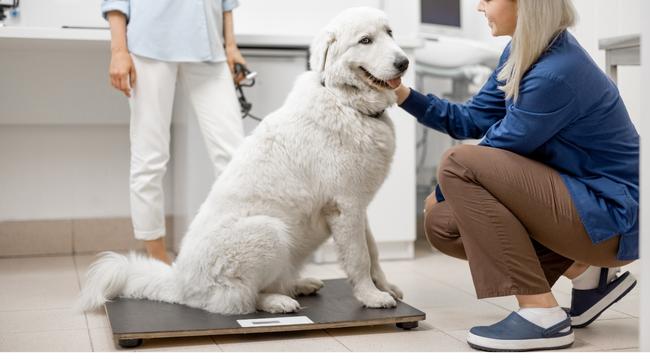How Much Should my Dog Weigh | Healthy vs Heavy Weighted Dogs

Showering love on our pets by over feeding them may create a very unhealthy situation for them. Obese dogs can have a number of weight related problems. Obesity is one of the greatest health concerns facing canine population! A heavy weighted dog is not necessarily a healthy dog. Extra weight can cause unnecessary suffering & shortened lifespan!
All dogs need to be slim, not fat, to be healthy. A dog is at the right weight if you can feel the ribs without excess fat covering. From the side, the dog’s belly should be tucked up, and from above, there should be a noticeable waist in front of the hips.
Read More: Beagle Pitbull Mix – Is This Cross Right for You?
The following problems may occur as a result of heavy weightedness:
- Joint or locomotion difficulties:- Their joints, ligaments, tendons, and bones suffer from excess wear and tear, so they land up with arthritis, joint injuries, leg problems, and back ailments.
- For females, greater probability of complications during whelping.
- Heart and Respiratory Disease:- extra weight in the body leads to cardiac disease, respiratory problems and high blood pressure.
- Diabetes:- Just like people, diabetes is common in obese dogs..
- Slower healing process.
- Liver Disease:- Obese animals are prone to liver disease including feline hepatic lipidosis.
- Heat Intolerance:-Insulating properties of excessive fat make obese dogs uncomfortable and unable to tolerate heat.
- Skin Problems:- fat dogs have trouble grooming themselves. The folds of skin built up by fat deposits becomes a haven for dirt, bacteria and other harmful organisms.
- Gastrointestinal Disorder:- Pancreatitis is seen in obese dogs. This condition is painful and life threatening.
With age, these physical problems increase and the quality of life decreases.
The animal has difficulty rising, walking, climbing stairs, running, and lying down. It becomes vulnerable to developing fatty tumours which can convert into malignant cancer.
In general, heavy weight dogs lead shorter, less comfortable lives than their healthier counterparts.
Tips to make a heavy weighted dog healthy:
- Eliminate table scraps. They are typically high in fat and calories.
- Ignore those “begging eyes”.
- Give your dog a massage, a walk, or other attention, instead of food as a treat.
- Slightly reduce the amount of commercial food (15-20%).
- Examine the fat content in the dog’s food. Dog food should have a max. fat content of approximately 12-16% during a weight loss programme.
- Feed smaller portions more often – two, three or even four small feedings can reduce calories and help the animal feel full.
- Keep water available all the time.
- Keep exercise simple and moderate. Over-exercising a fat dog can cause more harm than good. Gradually increase the intensity of exercise.
- Exercise your dog every single day.
- Have your fat dog follow you around while you do your usual household routine.
- Take advice from the dogfoodadviser before buying a dog food.
Your dog is a member of your family. You love him and want to keep him healthy. To do this, keep it fit, and not fat. Remind yourself that a healthy pet is an active pet. Put down the potato chips, get off the couch, and go play frisbee with your best friend!
Related Posts:
https://www.petdogplanet.com/teddy-bear-dog/
https://www.petdogplanet.com/short-legged-dog/
https://www.petdogplanet.com/most-trainable-dogs/
https://www.petdogplanet.com/velcro-dog/



